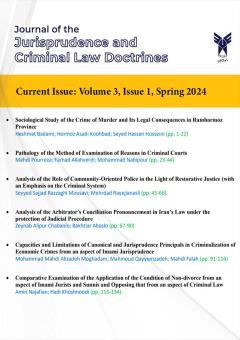The Role of the Hypothetical Analogy in the Rule of Al-Ta'azir Yodrao Be-Shobhah
Subject Areas : Jurisprudence and Criminal Law Doctrines
1 - Assistant Professor, Department of Jurisprudence and Law, University of Quran and Hadith Sciences, Qom, Iran
Keywords: hypothetical analogy, creative hypothetical analogy, incomplete hypothetical analogy, rule of Al-Ta'azir Yodrao Be-Shobhah,
Abstract :
The reported research in this article with descriptive analytical method and sometimes possessing critical description tries to determine the entrepreneur quality of hypothetical analogy in clarification of the idea of necessity or unnecessity of establishing the rule of Al-Ta'azir Yodrao Be-Shobhah. In this article, using the hypothetical analogy method is not aimed to strengthen or reject one of the two theories; but the goal is to show how each of the two reciprocal theories can be documented by hypothetical analogy and how this general method, how and with which of its types could play a role in these two theories. Although, supporters or opponents of the necessity of establishing the rule of Al-Ta'azir Yodrao Be-Shobhah in their speeches, did not mention the use of hypothetical analogy and its types; but it is possible to read their opinions based on the hypothetical analogy. The result of this reading revealed that two reciprocal opinions because of method are in common and use two types of hypothetical analogies, i.e. ideological coding and incomplete coding; but adjustment of these two methods to different premises, has caused the result of applying each of these methods is different from each others. The result of this similarity in the method and the difference in the finding, can help the researchers to focus on the premises of the theorems in the criticism of each of these two theories and not on the used method because the method is in both two rival theories is similar.
1. ابن فارس، احمد بن فارس، (1391ق)، معجم مقاییس اللغة، مصر، مطبعة البابي الحلبي و أولاده.
2. ابن منظور، محمد بن مکرم، (1414ق)، لسان العرب، بيروت، دار الفكر- دار صادر.
3. ایراوانی، محمد باقر، (1428ق)، دروس تمهیدیة في القواعد الرجالیة، قم، انتشارات قلم.
4. بجنوردی، سید محمد، (1385)، قواعد فقهية، تهران، مجد.
5. حائری، سید کاظم، (1415)، القضاء في الفقه الاسلامي، قم، مجمع فکر اسلامي.
6. حاجی ده آبادی، احمد؛ علی عسگری، سعید رضا، (1389)، قواعد فقه جزائی، قم، پژوهشگاه حوزه و دانشگاه.
7. حرانى، حسن بن على، (1404ق)، تحف العقول، قم، دفتر انتشارات اسلامی.
8. حر عاملى، محمد بن حسن، (1409ق)، وسائل الشيعة، قم، مؤسسه آل البيت عليهم السلام.
9. حیدری، سید علی نقی، (1412ق)، اصول الإستنباط، قم، مدیریت حوزه علميه قم.
10. زبيدي، سید محمد مرتضی، (1414ق)، تاج العروس، بيروت، دار الفكر.
11. سبحانی، جعفر، (1414ق)، المحصول في علم الاصول، قم، مؤسسه امام صادق علیه السلام.
12. سبزواري، سید عبد الأعلی، (1388)، مهذب الأحكام، قم، دار التفسیر.
13. شيخ صدوق، محمد بن علی، (1406ق)، من لايحضره الفقيه، بیروت، مؤسسه اعلمی.
14. شيخ طوسى، محمد بن حسن، (1407ق)، تهذيب الأحكام، تهران، انتشارات اسلامیه.
15. صاحب بن عباد، اسماعيل بن عباد، (۱۴۱۴ق)، المحيط في اللغة، بيروت، عالم الكتب.
16. فاضل مقداد، مقداد بن عبدالله، (1404ق)، التنقيح الرائع لمختصر الشرائع، قم، کتابخانه مرعشي نجفي(ره).
17. مجلسى، محمد باقر بن محمد تقی، (1403ق)، بحار الأنوار، بیروت، دار إحياء التراث العربي.
18. محقق داماد، سید مصطفی، (1383)، قواعد فقه، تهران، نشر علوم اسلامی.
19. مصطفوى، حسن، (1402ق)، التحقيق في كلمات القرآن الكريم، تهران، مركز ترجمه و نشر کتاب.

